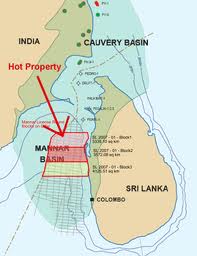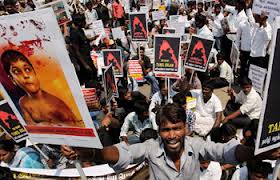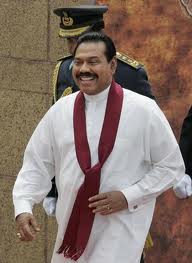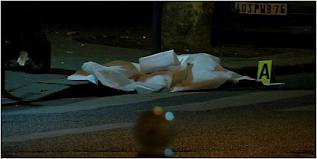One may be tempted to say that it is not the first case of impunity, not even in recent history. True: in Syria for example there are concurrent narratives of propaganda blaming alternatively the government and the rebels. But the novelty in respect of Sri Lanka is the absence of competitive perspectives. It is well known that China protects Sri Lanka; a little less divulged is the Indian protection of Sri Lanka. But the real point is that the West is actually not interested in accusing Sri Lanka. The US made very bland recommendations to Colombo, in comparison what is at stake. The impression is that the Sri Lankan government shall be charged for mishandling the behaviour of its troops. The boys went too far in certain circumstances, but we don’t have the political will to scold our naughty soldiers.
The accusation is far from this insipid criticism: the government of Sri Lanka launched a heavy military offensive against hundreds of thousands of civilians. Again, it’s better to have clear in mind that we are not speaking of isolated episodes: the plan was to bring war in the middle of Tamil inhabited areas. The operation was designed to bring havoc in every Tamil house. At the peak of the Vanni operation, almost half a million of people has been chased, starved and bombed out. It is less about the casualties and more about the intentions. The carnage of 80000 civilians is still not the most horrible part of the truth. Soldiers massively brainwashed and put under extreme psychological stress, can eventually go crazy and out of control. This is still criminal and to blame. But the Sri Lankan case is worst: the government planned to massacre the civilians. We are not discussing episodes of crossfire: we are accusing the government of Sri Lanka of heavy shelling on harmless population. Repetitively. It was a decision, it was planned.
And the United Nations, the government of USA, UK, India, France, Norway and Japan know what happened. The UN actually published a report where it estimates at 40000 the number of civilian casualties[1]. Moreover an internal inquiry from the UN provided even more critical observations about the accomplice negligence[2].
New Delhi provided military intelligence, electronic surveillance and field support on the ground: India was informed in real time. Actually, it was New Delhi that was informing Colombo about the development of action.
Now such carnage won’t be sanctioned.
Why? Several reasons for the convenience of geopolitical equilibrium. We have some suspicions that the oil discovery in the LTTE[3] controlled area could have been a game changer, especially for India (with Vedanta and Cairn) and European countries, like the UK (again with Cairn and Vedanta, both London-listed), France (with Total); but also Malaysia, with its powerful Tamil presence, was involved through Petronas[4].
Aside this allegation, the undisputed outcome is that Sri Lanka will walk away from a planned massacre with total impunity, because it made the right diplomatic move. Namely, it sought agreement with every power involved. With the US, Colombo justified the operation with war on terror (it was actually a civil war). With China, it sold out a port facility (to be included in the String of Pearls). With the other Sri Lanka exchanged attractive economic deals (the exploration rights have been ceded at bargaining price). In fact during the final phase of the war, the duo Kouchner-Miliband improvised a timid protest[5], but already in 2011 France was pledging support to Sri Lanka[6] (in 2012 Paris collaborated with Sri Lankan secret service in the extra-judiciary killing of an Ex-LTTE member Parithi[7] and in 2013 Total is ready to join the Mannar Basin deal[8]), while UK was deeply compromised with Colombo for arm trade (see the scandal that led to the resignation of Defence minister Liam Fox[9]) and economic interest (Cameron lobbied in favour of Cairn and Vedanta with Indian government[10]).
This episode will establish an important precedent in international jurisprudence: heavy diplomacy with all the parties, with all the regional and global powers will give you clearance on everything you do. Everything.






























